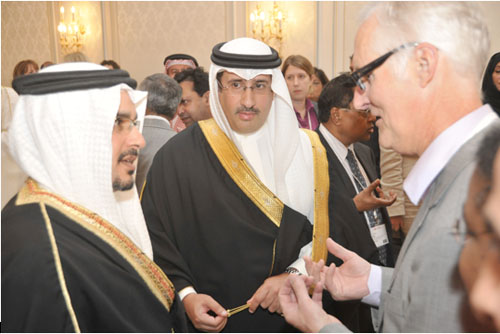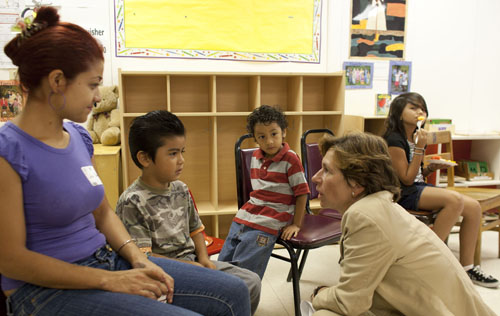
יום חמישי האחרון, השתתפתי בגאלה מסנוורת לראות את המורה לחינוך מיוחד מתיו קנינגהאם מקבל את פרס המורה לחינוך GEMS לחינוך מיוחד בשיקגו.. ואתמול, הקשבתי בזמן שאנדראס שלייכר הציג את הממצאים העיקריים מה- 2013 הוראת OECD סקר בינלאומי למידה (כאמור).
בהקשר של חינוך מהיר קדימה (EFF) עימות 10, “הוראה טובה יותר ללמידה טובה יותר: Results of the OECD Teaching and Learning International Survey (כאמור),” which followed, Lord David Puttnam reminded us all that change is painful. As a young aspiring tennis player with a forehand that needed re-invention, he had learned that lesson the hard way during the 1st round of Junior Wimbledon when it was too late for change.
Change in education has historically taken time, but in an age of innovation when technology is impacting every aspect of our daily lives at a tremendous pace, it is vital to understand the day to day issues faced by teachers globally and move rapidly from a policy standpoint to bring about the changes they need to improve student outcomes.
I asked Michael Fullan, Lord Jim Knight and Pasi Sahlberg to share their perspectives after the Education Fast Forward (EFF) עימות 10.
רבותיי, did the TALIS study ask all the right questions?
PASI Sahlberg: I think overall, TALIS provides important and interesting comparable insights into the teaching profession around the world. Did TALIS ask ALL the right questions? I think this is a question that probably will divide opinions. My own burning question that TALIS doesn’t shed light on is how the rapidly growing Teach for All movement is affecting teachers and their work, especially in countries that are seeing many of their new teachers coming from these fast-track teacher prep programs. Another theme that remains quite silent in this survey is how significant leadership is in making schools work well. TALIS focused primarily on teachers and much less so on school leaders.
מייקל פולאן: The TALIS study is valuable to generate a strong debate on the current status of teaching. It fell short because it generated what I call ‘Dangerous Half Truths’ – findings that have some merit but are deficient because they can be easily misinterpreted and result in superficial or harmful policies. לדוגמא, the finding that teacher appraisal/feedback can lead to positive change in classroom practice fails to specify under what conditions this would be true (true if there is a collaborative and growth oriented culture; false if there is a punitive carrot and stick culture). The same problem affects the other big factor examined, Professional Development, which again only is effective when it contains strong pedagogical content and is integrated into the school improvement plans of school leaders and teachers working together.
לורד ג'ים נייט: באופן כללי, כן, the study did ask all the right questions. It is always possible to quibble but it remains very insightful for secondary schools. I would have loved to see elementary school data to make a comparison.
What was the most important take home for you?
PASI Sahlberg: I think the most interesting take-away for me is teachers’ views of the way society values the teaching profession and how wide the gap is between the countries where teachers feel they are valued and where they feel they are not. It is alarming to me that in France, Sweden and Spain, less than one of ten teachers feels valued. This suggests that it is not just more professional development or more pay that will change this dangerous trend, but more fundamental change in the role of how teachers are treated is needed.
מייקל פולאן: The most important take away was the consistency of findings throughout the report that showed that teacher efficacy and job satisfaction were strongest when teachers work together, and principals work as instructional leaders helping teachers work in collaborative focused ways on the student learning agenda. לרוע המזל, these findings tend to be underplayed because of the focus on appraisal and professional development. Not enough was made of the more powerful conclusion that improvement happens more deeply and more quickly when school leaders and teachers work together in focused ways on improving learning and achievement.
לורד ג'ים נייט: The most important take away is the importance of collaboration and feedback to drive development.
What are the key things we need to do to improve the teaching profession?
PASI Sahlberg: If teachers are to engage in professional development, collaborative school improvement and pedagogical reflection in their work, as TALIS shows successful education systems do, changes in teachers’ working conditions must take place. בחלק מהמדינות, מורים’ work loads before professional development and collaboration in school are so big that, ברוב המקרים, they don’t have time and energy to do anything else. One thing that should improve is better teacher policies in national education strategies. This includes as much how teachers are prepared as how they should be helped and supported in their work. We should stop thinking that teaching is easy and therefore anyone can be a teacher. Instead we should think that teaching is not rocket science, it much more complicated than that.
מייקל פולאן: We need to stop counting so heavily on teacher appraisal based on carrots and sticks, and instead build the profession through i) focused intra-school collaboration; ii) focused inter-school learning; iii) standards for students, teachers and school leaders that are developmental driven; iv) transparency of practice and results; and v) generally involving the profession in developing solutions that affect all teachers. The TALIS report skirted around the key dilemma of moving from negative accountability to accountability driven by the group in relation to external requirements.
לורד ג'ים נייט: We need to incentivise teachers so that they use collaboration in an inventive way versus a mandated way. Teachers should have the right to more time for professional development.
More about EFF Debate 10 including Andreas Schleicher’s presentation.
Michael Fullan is the author of many books on education and a co-author of הון מקצועי: הפיכת הוראה בכל בתי ספר. Lord Jim Knight is Managing Director of TSL Education, the largest network of teachers in the world. Pasi Sahlberg is the author of שיעורים פיניים: מה אפשר ללמוד מעולם השינוי חינוכי בפינלנד?


Photo of sky scene is courtesy of GEMS Education
בגלובל החיפוש לחינוך, להצטרף אליי ולמנהיגי מחשבה מוכרת בעולם כולל סר מייקל ברבר (בריטניה), DR. מיכאל בלוק (ארה"ב), DR. ליאון בוטשטיין (ארה"ב), פרופסור קליי כריסטנסן (ארה"ב), DR. לינדה דרלינג-Hammond (ארה"ב), DR. Madhav אוון (הודו), פרופ 'מיכאל Fullan (קנדה), פרופ 'הווארד גרדנר (ארה"ב), פרופ 'אנדי הארגריבס (ארה"ב), פרופ 'איבון הלמן (הולנד), פרופ 'קריסטין Helstad (נורווגיה), ז'אן הנדריקסון (ארה"ב), פרופ 'רוז Hipkins (ניו זילנד), פרופ 'קורנליה הוגלנד (קנדה), הכבוד ג'ף ג'ונסון (קנדה), גברת. שנטל קאופמן (בלגיה), DR. Eija Kauppinen (פינלנד), מזכיר המדינה Tapio Kosunen (פינלנד), פרופ 'דומיניק לפונטיין (בלגיה), פרופ 'יו לאודר (בריטניה), פרופ 'בן לוין (קנדה), לורד קן מקדונלד (בריטניה), פרופ 'בארי McGaw (אוסטרליה), שיב נדאר (הודו), פרופ 'R. נטריגין (הודו), DR. PAK NG (סינגפור), DR. דניז אפיפיור (ארה"ב), שרידהר ךאג'גופלן (הודו), DR. דיאן ראוויטש (ארה"ב), ריצ'רד וילסון ריילי (ארה"ב), סר קן רובינסון (בריטניה), פרופ Pasi Sahlberg (פינלנד), פרופ Manabu סאטו (יפן), אנדריאס שלייכר (PISA, OECD), DR. אנתוני סלדון (בריטניה), DR. דוד שפר (ארה"ב), DR. קירסטן Immersive Are (נורווגיה), קנצלר סטיבן ספאן (ארה"ב), איב Theze (Lycee Francais ארה"ב), פרופ 'צ'רלס Ungerleider (קנדה), פרופ 'טוני וגנר (ארה"ב), סר דייוויד ווטסון (בריטניה), פרופסור דילן Wiliam (בריטניה), DR. מארק Wormald (בריטניה), פרופ 'תיאו Wubbels (הולנד), פרופ 'מייקל יאנג (בריטניה), ופרופ 'Minxuan ג'אנג (סין) כפי שהם לחקור שאלות חינוך תמונה הגדולות שכל המדינות מתמודדות היום.
גלובל החיפוש לחינוך עמוד קהילה
C. M. רובין הוא המחבר שתי סדרות מקוונות רבים קוראות שלהיא קיבלה 2011 הפרס אפטון סינקלר, “גלובל החיפוש לחינוך” ו “איך וויל אנחנו קראו?” היא גם מחברם של שלושה ספרים רבי מכר, כולל אליס בארץ הפלאות Real, הוא המוציא לאור של CMRubinWorld, והוא משבש קרן עמית.
עקוב C. M. רובין בטוויטר: www.twitter.com/@cmrubinworld






תגובות אחרונות